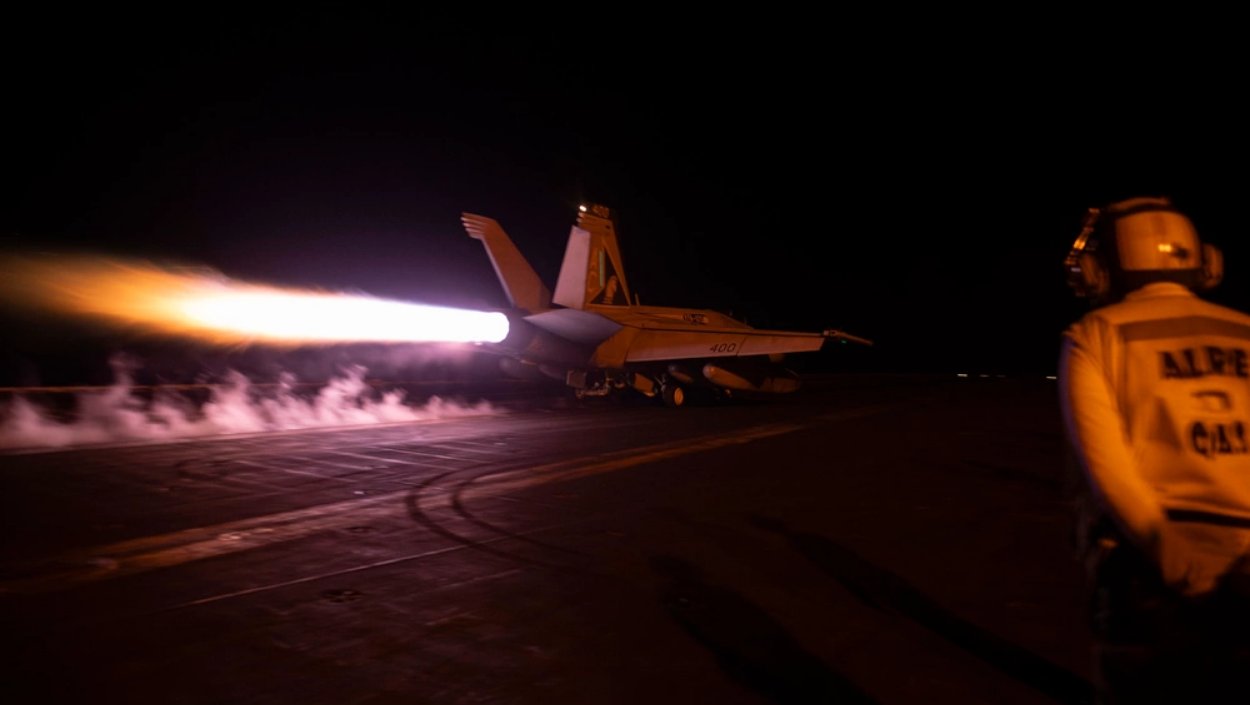

After two days of widespread military operations in the Middle East, American officials say the airstrikes against Iranian-backed groups in Iraq, Syria and Yemen are just the beginning.
The operations came almost a week after a drone attack killed three American soldiers at the Tower 22 base in Jordan and wounded dozens more. On Friday the United States bombed seven sites in Iraq and Syria, using more than 125 munitions. The operations targeted groups linked to Iran’s Islamic Revolutionary Guard Corps. The U.S. said the targeted areas were involved in attacks against American forces. On Saturday the U.S. and British forces hit 36 targets in Yemen, including the capital city of Sana’a, aimed at diminishing the capabilities of the Houthi movement.
Shortly after Friday’s operations, officials including President Joe Biden and Defense Secretary Lloyd Austin issued statements saying the strikes on Iraq and Syria were just the first part of a larger response. Biden in particular said U.S. action “will continue at times and places of our choosing.”
Speaking to “Face the Nation” today, National Security Advisor Jake Sullivan said that although the U.S. is not seeking an “open ended military campaign” additional operations in the Middle East are coming.
“[…] what happened on Friday was the beginning, not the end of our response, and that there will be more steps, some seen, some perhaps unseen, all in an effort to send a very clear message that when American forces are attacked, when Americans are killed as three service members, tragically were at Tower 22, we will respond and we will respond forcefully,” Sullivan said. “And we will respond in a sustained way.”
Despite the strikes being meant to “degrade” these various group’s abilities to attack American forces, they have not stopped. The Washington Post reports that a U.S. military outpost in Syria was targeted by rockets on Saturday, although no injuries were reported. Shortly after the operations in Iraq and Syria, Houthi rebels launched several drones over the Red Sea on Friday. Even after the strikes on the Yemeni capital of Sana’a Saturday, CENTCOM said it fired on a Houthi anti-ship missile that it claimed was an “imminent threat” to Navy vessels in the region.
Since the start of Israel’s war in Gaza in October, several groups with Iranian support have launched attacks on American forces, in protest over American support of Israel. There have been more than 150 attacks, which left dozens wounded. The Jan. 28 drone attack in Jordan was the first to result in American military deaths.
Meanwhile, the Iraqi government is not happy with the airstrikes within its borders. After the United States said it gave Iraq prior warning before Friday’s strikes, a government spokesman denied any coordination. The bombings killed members of militias that belong both to the Islamic Resistance of Iraq (a collection of Iraqi armed forces backed by Iran and opposed to the American presence in the country) and the Popular Mobilization Forces, which were legitimized and brought into the Iraqi security apparatus during the fight against ISIS. Iraq also said that the attacks killed several civilians. This weekend Iraq’s Ministry of Foreign Affairs called in the Chargé d’Affaires of the American embassy to give him an official note of protest, according to a statement from the ministry. Iraq called out attacks on civilians and members of the Iraqi security forces.
“As well Iraq further emphasized its rejection to be a ground for settling scores between rival countries, as our country is not a place for sending messages, and show of force between adversaries,” the statement continued. “The Iraqi government will exert all the efforts required by ethical, national and constitutional responsibility, to protect our lands, cities and the lives of our civilians and all security forces.”
Subscribe to Task & Purpose Today. Get the latest military news and culture in your inbox daily.
Speaking on Sunday, Sullivan said that the United States is still examining casualties from Friday’s attacks, including the claims that civilians were killed. “I don’t have anything to report to you this morning publicly on that,” he said. “But we will continue to make our assessments.”
This is the latest tension between the two governments. Although the current prime minister had previously said U.S. troops were still needed to train Iraqi forces, recent American operations have sourced that. A Jan. 4 airstrike in Baghdad killed a leader of the Harakat-al-Nujaba militia, one of the groups that makes up the PMF. The U.S. said that the commander was involved in planning attacks on Americans.
Following the Baghdad airstrike, Iraqi Prime Minister Mohammed Shia al-Sudani floated the possibility of starting talks to get American forces to withdraw from the county. The U.S. has approximately 2,500 troops in Iraq as part of Operation Inherent Resolve. The Pentagon has denied that a withdrawal is on the table.
The latest on Task & Purpose
- The Army asked soldiers to turn in excess gear. It got back 37,000 items
- Medal of Honor recipient Clint Romesha unpacks life as a tanker
- Navy SEALs who disappeared during mission off Somalia identified
- Ukrainian Bradley only had a two-person crew when it wrecked a T-90
- China is expanding its marine corps, but how capable is it?